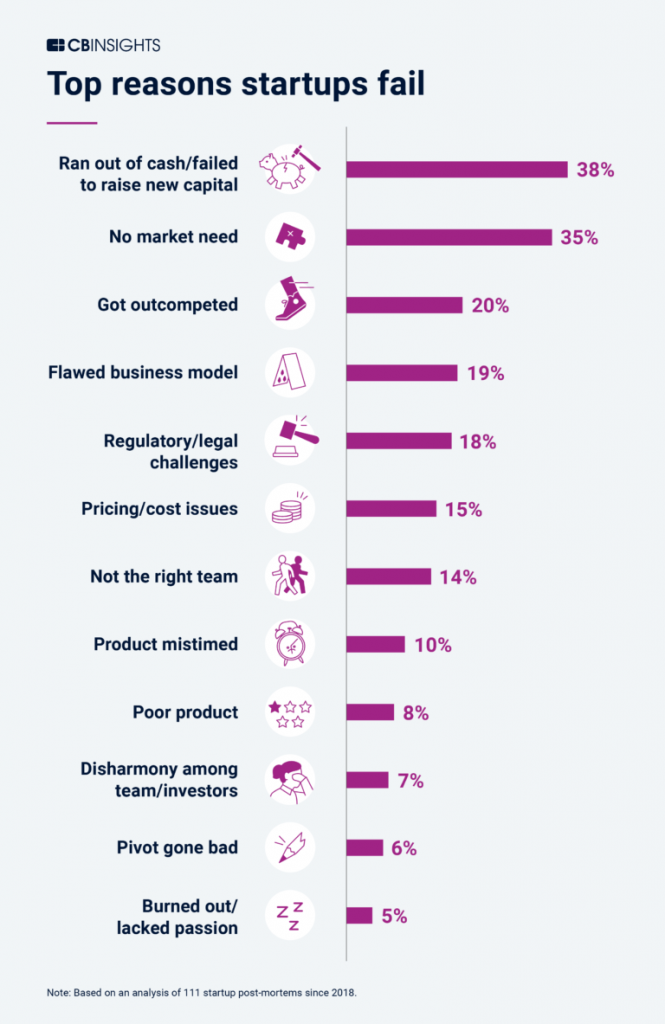Consider this as my prose on entrepreneurship. Entrepreneurship might be a science but NOT rocket science definitely. Decades ago gadgets like iPods and Palmtops were invented which received attention and success for a shorter period and soon got cannibalised by their very own new and innovative products. You, me or nobody will ever be able to tell what will the market look like 10 or 20 years down the line. According to various research, 80 to 85 per cent of statistics is wrong. Everything is an observation based on the historic and present market trends. Look at the COVID-19 scenario, it really has wrecked most of the industries like a quick blow of air to a house of cards.
Even millionaires and billionaires have to work hard in order to establish a use case for what they invent. Look at Elon Musk‘s Neuralink, and Facebook’s Metaverse. Whether or not they are needed, they are still being developed and hyped around.
Forget listening to trends, things change fast – thanks to the internet and globalisation. Everything and anything works when passion meets strategy. Consistency is the key, wait for the right time. There is no such thing as an overnight success. You might not like a functional member of a family while you are busy working on your and ideas, executing your passion, but you need to stop tolerating everyone, YES, your family members too. People elder than you might be of more life experience than you, but you are made of more intellect and bigger dreams.
Consuming data and reports are important, but having inspiration and believing in yourself is legendary. There is a stigma attached to the startups called ‘Uniqueness’ I believe, there is no unique or perfect startup idea available in the market, only the ones that make revenue are picked up by the investors; Yes, revenue is important for both you and the investor.
According to Exploding Topics, 90 percent of startups fail.
- 20% of new businesses fail within the first two years of inception.
- 45% of new business startups don’t survive till the fifth year.
- 65% of new startups fail during the first ten years.
- 75% of American startups go out of business during the first 15 years.

Reasons why startups fail
Although there can be specific issues and mistakes for respective startups that fail, the most common ones are:
- Failure to attain Product-Market fit
- Failure to retain customers
- Failure to develop a recurring revenue model
- Poor management
- Lack of funds
Let us now look at these startup failure reasons one by one.
1. Failure to attain Product-Market fit
The concept of product-market fit was initially created by Andy Rachleff, co-founder of investing firms Benchmark Capital and Wealthfront. According to Rachleff, before focusing on the growth hypothesis, companies should develop and evaluate their value hypothesis.
“When you first start out, the only thing that matters is finding a cohort of customers who truly value what you offer. Growth alone means next to nothing.” says Andy Rachleff
Many startups fail because they are unable to create a product that appeals to the market. This could be because of straightforward execution. Another possibility is a failure to create Product/Market Fit, which is an issue with the strategy.
Creating a product that the market wants is essential to preventing your firm from running out of money, despite the fact that it may seem apparent. It’s all too simple to develop a product in a back room for months or years just to discover that no one wants to use or purchase it. Products that the market doesn’t desire waste time and money, as well as yours as an entrepreneur. Finding the ideal balance between client input and upholding your change-the-world mission is challenging, but it’s essential to everything that comes after hiring a fantastic staff, raising money, and selling your product.
2. Failure to retain customers
Nonetheless, many businesses struggle to keep their existing clients. To expand your business, you must do more than just attract new clients. You must also devote time and money to maintaining your current consumers. Getting repeat business is substantially less expensive than getting new clients.
Existing clients have a greater conversion rate for obvious reasons. And when you can keep your current consumers, you have additional possibilities to get to know them better. Strong client retention also contributes to the reputation of your brand.
Some of the common reasons why startups usually fail to retain customers are as follows:
- They focus only on getting new leads or customers
- They do not offer discounts to existing customers
- They do not establish good customer service
- They do not assess the market competition
- They don’t seek or avoid customer feedback
3. Failure to develop a recurring revenue model
Before talking about the problem, let’s look at the meaning of the ‘recurring revenue model’.
It is a business model in which the seller grants access to a product or service in exchange for a recurring price collected at certain intervals (monthly, quarterly, or yearly). This is the foundation for subscription companies and membership services like Netflix, Country Delight, and many innovative tech startups we witness today.
The system where customers purchase products or services from you regularly, guarantees predictable cash flow and a sustainable profit margin for the firm. In contrast to typical one-time sales, where the interaction between the vendor and the customer terminates after a single transaction, the recurring income business model assists in establishing a deeper relationship with customers in order to achieve high customer retention.
Types of recurring revenue business models:
- Subscriptions
- Memberships
- Supplementary purchases
- Long-term contracts
4. Poor management
Management ineptitude is definitely one of the most significant factors in startup failure.
It is also true that most of the people who engage in poor management are unaware that they lack the necessary skills and training. They can’t see where they’re going wrong since they’re relying on instinct. Working for someone like her might mean anything from having a demanding employer to working with a loose cannon.
Startup founders frequently assume they are putting the interests of the firm first, not recognising that their workers are their most important asset. No matter how fantastic the concept, a startup is doomed unless its employees are extremely engaged and pleased.
If management skills are not sufficiently developed. Daily demands may quickly lead to poor decisions, unstable processes, and reactive decisions.
Employees create or destroy an organisation, yet some managers have this undesirable character of endorsing themselves and believing that the company would not exist without them. On top of that, they think that employees can be replaced easily.
Managers who are immature, or arrogant continue to take all the credit even though their staff is working hard to help the company achieve its goals.
Many managers assume that paying employees a salary is complete compensation for their efforts. It is not unusual for these bosses to adopt an unpleasant management style that keeps staff on the clock and constantly monitored.
Good managers, on the other hand, learn to work with people rather than manage them. They foster mutual respect and trust. They know how to encourage employees and understand that the motivation and engagement of their workers are critical practices to the success of their company. They encourage personal development, innovation, and individual needs of the staff members.
5. Lack of funds
Now we are talking! The reason why countless startups fail is due to a lack of funds or their inability of unable to convince the angels and venture capitalists to raise funds. According to Inc.com, 42 per cent of startups fail due to the lack of initial funding.
Is it a problem with the business model?
Many times, it is not the business model to blame. Startup founders often make the mistake of not having a direct approach to investors. Instead, they indulge in unnecessary discussions with low-key accelerators, incubators, middlemen, and also impostors that only waste their time.
Why do startup founders fail to convince investors?
Many startup founders look out for quick success. Without even hitting their heads on the idea, they go straight to the investors all blank with a motive to raise funds, and not for guidance. Consequently, they fail to convince investors. Often, they fail to understand the investor’s side or find it difficult to implement what the potential investor is trying to teach.
Remember, an investor is more than just money. They can build or break your startup.
Hustling is not always good
The startup ecosystem that we witness today is infected with a phobia that dictates ‘hustle’ as an integral part of starting up and growing a business.
As a result, almost all newbie founders glamorise hustling and spend their days and nights building a successful startup that they desire in order to impress investors. And when they reach the end of the maze, they receive cryptic opinions and reviews from the investors – about their idea, product, and qualification etc.
Venture capital or External investment – is it always good?
Venture capital is a fantastic resource for early-stage companies, but far too many entrepreneurs are unduly fixated on it and fail to grasp the bigger picture. The truth is that venture capital isn’t all that it’s cracked up to be. In fact, too much venture capital may be detrimental to a company’s ability to go public (IPO).
There are many big names from the startup ecosystem that are thriving without raising a penny from external investors or were already successful before raising funds. Want to know their names, here are some: Zoho, Spanx, Mailchimp, HappyFox, QuackQuack, and there are many.
Bootstrapping – Good or Bad?
They spend too much from their pocket to look fundable to the investors. Yet, they fail to garner investor interest and fail miserably while bootstrapping as they run out of cash in their pockets. Wait, bootstrapping is not all bad. There are successful businesses and startups in the world that are bootstrapped and successful – Yes, without raising any external capital. There is no overnight success formula and even the funded startups fail.
According to The National Venture Capital Association, 25% to 30% of venture-backed businesses fail.
The art of bootstrapping a startup is simple, start investing small in your startup and gradually increase the amount as the revenue grows.
Prevent your startup from failing
While there are respective reasons for every startup that fails, there are certain steps that you can take to properly assess your startup idea, launch, and decide upon raising funds:
- Conduct market research
- Build direct relationships with investors
- Build a right team
- Embrace leadership skills
- Establish a product-first company
1. Conduct market research
It is not just about passion, starting out without appropriate passion can be self-destructing. In today’s competitive business environment, it is imperative to spend time investigating your business idea to determine whether or not there is a market for your product or service.
It is not necessary to invest a hefty amount in research. There are many renowned research firms like Redseer which provide analysis and research reports on various industries and that too for Free! Follow the available market research guides on the web to ease your process.
2. Build direct relationships with investors
In my experience, it is impossible to raise funds without building direct relationships with investors. Though it is difficult to get a heads-up when you contact an angel investor directly, it is definitely worth a try. Build a solid LinkedIn profile and send connection requests to various angel investors who have a portfolio of investments in your sector.
An angel investor can act as a good mentor for you and help you think wisely about whether or not you need an investment to run your startup. The majority of startup founders fail to believe that they can run their businesses without funding and wait until the time is right.
Alternatively, you can explore startup advisors on LinkedIn. An advisor act as a mediator between you and potential investors.
3. Build a right team
Having a good team of people to work with you is critical for the success of your business. Recruiting involves considerable attention to ensure that each person brings new expertise to your company. Do not hire simply on the basis of their qualifications and experience, but look beyond that. Put potential candidates through various tests.
Assess whether the potential applicant is a good fit for working in a newly launched startup like yours. You must also make sound decisions about your employees’ pay. If you are bootstrapping, you may start by hiring interns. At the same time, it is important that you are ready to hire and manage a remote workforce.
“Right now, if you’re not offering flexible or remote program, you’re missing out on 50% to 70% of candidates,” says Rey Ramirez, cofounder of Thrive HR Consulting
Look for leadership skills in your potential employee in addition to core competence. This workforce that you employ in the early stages of your startup launch will be able to lead their subordinates greatly in the near future.
4. Embrace leadership skills
Everyone with a startup idea thinks that they are a leader, but the majority of them are not. It is not a piece of a pie. At all levels, successful companies rely on leadership and the capacity of a few to coordinate both short-term and long-term goals. On the surface, this looks straightforward, but the fact is that not everyone is cut out to manage and maintain a successful business. It necessitates a specific mentality and skill set.
People who only rely on their core skills and do not focus on building leadership skills can never obtain a good co-founder or partner to scale their companies. If you are a CTO of your startup on the basis of your tech skills, you won’t be able to prove yourself a good leader for the company that you are running.
Here’s how entrepreneurs build leadership skills:
- Building knowledge
- Joining training programs
- Connecting with mentors and advisors
- Understanding the team and solving problems
- Identifying and retaining the best talent
5. Establish a product-first company
Being a product-first company or startup is about putting innovation and customer satisfaction
Product-first companies trust what they create and create a lasting impact on the users. A product entrepreneur enjoys the rush of constantly improving its offering and keeping it far ahead of the competition. A prime example is Steve Jobs and his management style at Apple. He created Apple with the sole purpose of producing the finest products! Product-first leaders have a compelling, well-expressed vision. As the firm grows, they place a strong emphasis on cultivating employees that embrace this product-first philosophy.
A product-first company has the potential to expand far quicker than a sales-driven company. Also, by having a product or service that sells itself, product-focused startups enjoy good ROI. The final outcome of this strategy will be a brand worth talking about. Your brand will have a compelling objective that addresses a problem while distinguishing your firm from the competition. All of these factors make the passion and guts required to start a product-first firm worthwhile.
Over to you…
So that was my two cents on why startups fail, the mistakes that startup founders make, and how you can prevent your startup from failure. Let us know your thoughts in the comments below.






